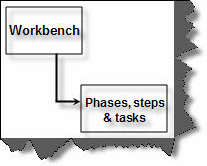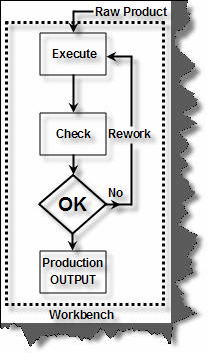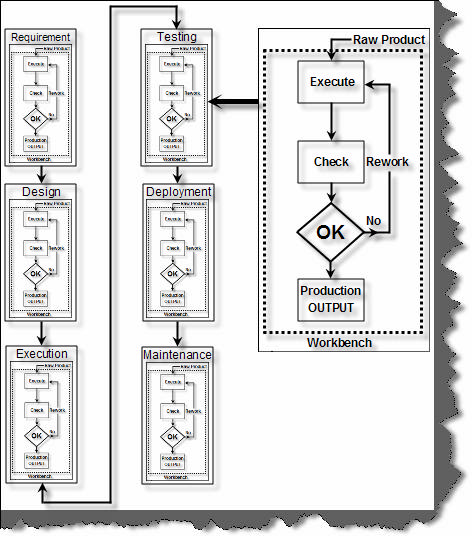In order to understand testing methodology we need to understand the concept of workbench. Workbench is a way of documenting how a specific activity has to be performed. A work bench is referred as phases, steps and tasks as shown in the below figure.
 Workbench with phases and steps
Workbench with phases and steps
There are four sections for every work bench:-
- Input: – Every task needs some defined input and entrance criteria. So for every workbench we need defined inputs. Input forms the first steps of the work bench.
- Execute: – This is the main task of the workbench which will transform the input in to expected output.
- Check: – Check steps assure that the output after execution meets the desired result.
- Production output: – If the check is right Production output forms the exit criteria of the workbench.
- Rework: – During the check step if the output is not as desired then we need to again start from the execute step.
Below figure shows all the steps for a workbench.

Details phases in workbench
In real scenarios projects is not made of one workbench but of many connected workbenches. A work bench gives you a way of organized thinking to perform any kind of task with proper testing. You can visualize every software phase as a work bench with execute and check steps. The most important point to note is if we visualize any task as a work bench by default we have the check part in the task. Below figure shows how every software phase can be visualized with a concept of workbench. Let us understand the work bench concept in a detailed fashion:-
Requirement phase workbench: – Input is the customer’s requirement, we execute the task of writing a requirement document, we check if the requirement document addresses all the customer needs and the output is the requirement document. Design phase workbench: – Input is the requirement document, we execute the task of preparing a technical document, review / check is done to see if the design document is technically correct and addresses all the requirements mentioned in the requirement document and output is a technical document.
Execution phase workbench: – This is the actual execution of the project. Input is the technical document; execution is nothing but implementation / coding according to the technical document and output of this phase is the implementation / source code.
Testing phase workbench: – This is the testing phase of the project. Input is the source code which needs to be tested; execution is executing the test case and output is the test results.
Deployment phase workbench: – This is the deployment phase. There are two inputs for this phase one is the source code which needs to be deployed and that is dependent on the test results. Output of this project is that the customer gets the product which he can now start using.
Maintenance phase workbench: – Input to this phase is the deployment results, execution is implementing change request from the end customer, check part is nothing but running regression testing after every change request implementation and output is a new release after every change request execution.

Workbench and software life cycles